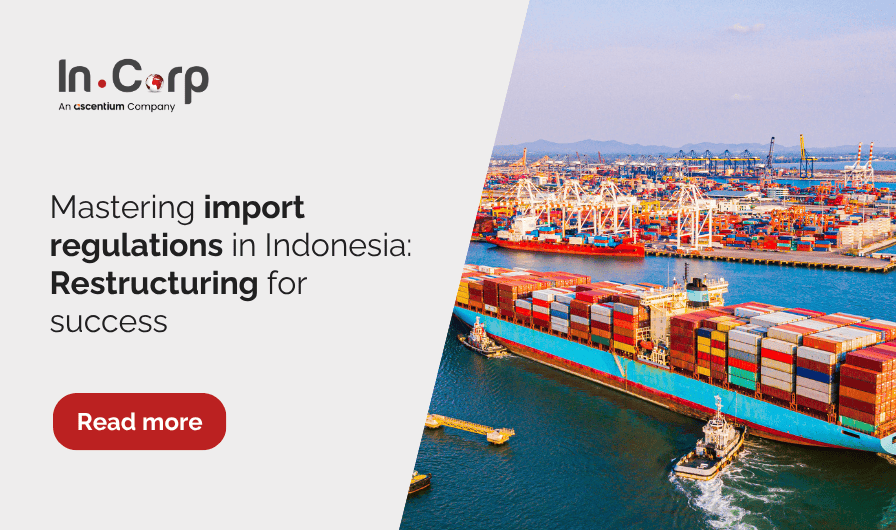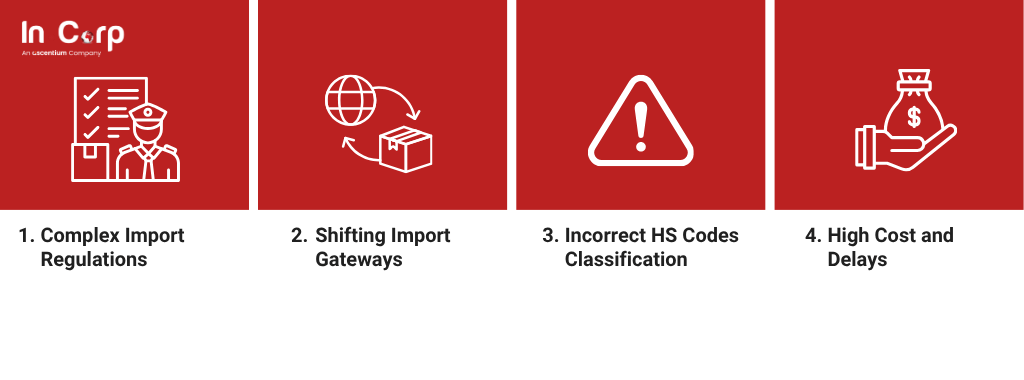Importing goods into Indonesia offers significant opportunities, but it also brings challenges. Frequent updates in import regulations can disrupt supply chains if businesses are unprepared.
Proper import restructuring ensures goods are classified correctly, permits are obtained, and compliance is met. Without it, the effects on manufacturers and importers often mean delays, higher costs, and penalties.
Common challenges of importing goods to Indonesia
Importers may face several recurring obstacles that make compliance and cost control difficult. Let us look at the most common challenges:
Complex Import Regulations
Indonesia has strict import regulations. Businesses must follow detailed rules for licenses, permits, and classifications. Missing one step often leads to delays and extra costs.
Shifting Import Gateways
Recent import gateway shifts and the relocation of import entry points in Indonesia create uncertainty for importers. When entry points change, companies must quickly adjust logistics, which can increase expenses.
Incorrect HS Code Classification
A major issue lies in misclassifying products under the HS Code. Using the wrong code may lead to:
- Higher import duties
- Penalties or customs investigations
- Goods being held or seized at ports
High Costs and Delays
Without proper planning, businesses face unpredictable expenses, such as long customs clearance times, unexpected tariffs, and rising storage fees.
Import restructuring is the key to avoiding costly mistakes and speeding up clearance. Businesses can navigate the import process more efficiently by ensuring accurate documentation, correct HS Codes, and compliance with import regulations.
Read more: 5 common import issues in Surabaya: What businesses need to know
Understanding HS Codes: Why it is important
Every imported product is assigned a Harmonized System (HS) Code. These are standardized codes used globally to identify products. They provide proper classification, correct tariffs and taxes, and better trade monitoring flows.
Why Accurate HS Codes Matter
Incorrect HS Codes can cause serious problems for importers, such as:
- Higher tariffs and unnecessary costs
- Goods being held at customs
- Penalties or delays in shipment clearance
Using the correct HS Codes from the beginning can help companies cut costs, protect supply chains, and comply with local import regulations.
Leveraging Free Trade Agreements (FTAs) in Indonesia
FTAs are trade deals between countries that aim to reduce tariffs, simplify customs procedures, and encourage smoother trade flows. FTAs open the door to lower costs and wider market access for businesses importing into Indonesia.
Here are several FTAs in Indonesia:
- ASEAN Free Trade Area (AFTA)
- ASEAN-China Free Trade Agreement (ACFTA)
- Comprehensive and Progressive Agreement for Trans-Pacific Partnership (CPTPP)
Benefits Of Using FTAs
Applying FTAs correctly offers clear advantages:
- Lower Import Tariffs: Businesses save money by paying reduced or zero duties on eligible products.
- Improved Competitiveness: Lower costs allow companies to price more competitively in the Indonesian market.
- Faster Customs Clearance: Streamlined procedures help goods move across borders with fewer delays.
- Stronger Market Access: Companies gain easier entry into partner countries, supporting imports and exports.
- Supply Chain Efficiency: Reduced costs and faster processing improve logistics performance.
A substantial import restructuring can ensure companies maximize savings and efficiency under FTAs.
How important is restructuring for importers
To navigate Indonesia’s evolving import regulations, businesses need the right strategies to ensure compliance and efficiency. Here is how import restructuring can support that goal:
Proper HS Codes Assessment
Accurate HS Code validation ensures your goods are classified correctly under Buku Tarif Kepabeanan Indonesia (BTKI) 2022. This prevents misclassification, reduces the risk of penalties, and helps businesses calculate import costs precisely.
Streamlined Import Requirements & Licensing
By aligning HS Codes, compliance needs, and FTA tariff benefits, companies can cut unnecessary expenses, maximize savings, and smooth the import process.
Effective Import License Assistance
A well-managed license application speeds up approvals, avoids administrative setbacks, and prevents shipment delays.
Read more: Indonesia’s top import-export business ideas
Streamline Your Importation with InCorp
Dealing with Indonesia’s import regulations can be complex, but InCorp Indonesia (an Ascentium Company) offers the right solutions to help businesses stay compliant and efficient. With our extensive knowledge and experience, you can trust that we will confidently guide you through the process.
With InCorp, you benefit from:
- Import Permit Assistance: Secure the licenses you need quickly and avoid costly delays.
- Importer of Record (IOR) Services: Import goods into Indonesia without a license, ensuring faster market entry.
- Import Restructuring: Organize HS Codes, permits, and documentation to cut costs, reduce risks, and speed up clearance.
By relying on our expert guidance, businesses can save time, reduce costs, and ensure imports run smoothly without disruption. Our services are designed to give you the best possible outcome so that you can look forward to a successful import process.
Contact us today and seize the import opportunities in the Indonesian market. Do not wait; take the first step towards a successful import process now.
Frequently Asked Questions
Why is import restructuring important under Indonesia’s import regulations?
Import restructuring helps businesses stay compliant with evolving import regulations, cut costs, and avoid delays at customs.
How do HS Codes affect import regulations?
HS Codes classify products under Indonesia’s import regulations. Correct codes prevent misclassification, penalties, and shipment delays.
What role do import licenses play in import regulations?
Import licenses are mandatory under import regulations. A well-managed license application speeds approvals and ensures goods clear customs smoothly.
How do Free Trade Agreements (FTAs) support compliance with import regulations?
FTAs reduce tariffs, simplify procedures, and improve market access. When aligned with import regulations, they help companies save costs and strengthen competitiveness.
How can businesses benefit from restructuring to comply with import regulations?
By validating HS Codes, leveraging FTAs, and streamlining licensing, businesses can reduce risks, protect supply chains, and maximize efficiency under Indonesia’s import regulations.
Get in touch with us.
What you'll get
A prompt response to your inquiry
Knowledge for doing business from local experts
Ongoing support for your business
Disclaimer
The information is provided by PT. Cekindo Business International (“InCorp Indonesia/ we”) for general purpose only and we make no representations or warranties of any kind.
We do not act as an authorized government or non-government provider for official documents and services, which is issued by the Government of the Republic of Indonesia or its appointed officials. We do not promote any official government document or services of the Government of the Republic of Indonesia, including but not limited to, business identifiers, health and welfare assistance programs and benefits, unclaimed tax rebate, electronic travel visa and authorization, passports in this website.




